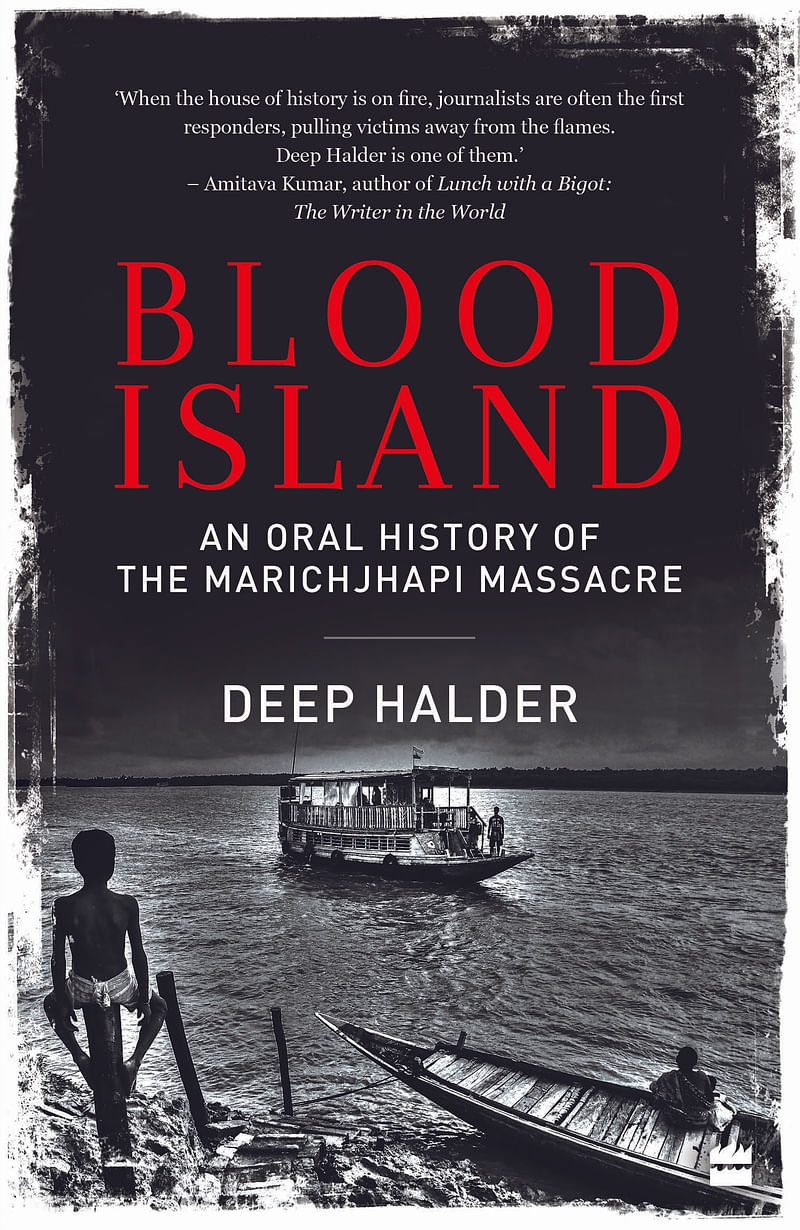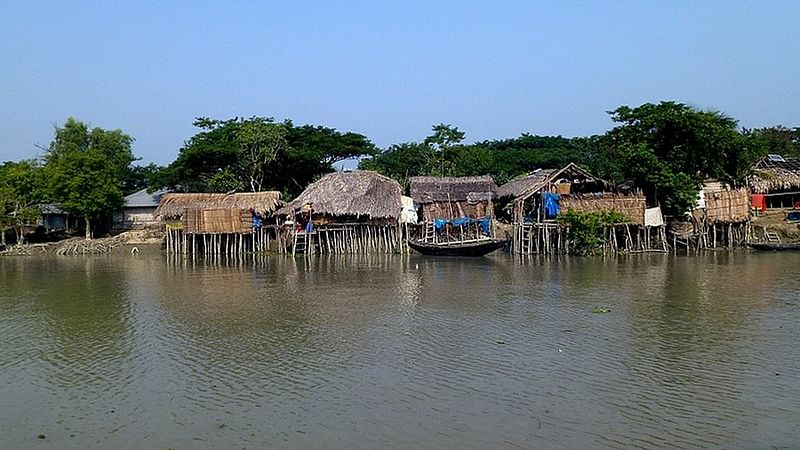Journalist Deep Halder reconstructs the events through oral retellings. Here he talks to Santosh Sarkar, one of the people who had made Marichjhapi home.
The economic blockade put in place by the [West Bengal] state government [on Marichjhapi] had begun unannounced. Around thirty police launches and two B.S.F. steamers had circled Marichjhapi on 26 January, preventing islanders from taking boats out to fetch food, water and other essentials from neighbouring islands. Not that they did not try to break through the cordon, but the police launches were quick to attack the boats and drown them, forcing the men to swim back to the island. Some were picked up and taken away to police stations.
‘On the morning of 31 January, we decided on a new plan. Our leaders, Satish Mondal and Rangalal Goldar, said women would row boats to the next island to fetch clean during water and grains, as well as medicine for the sick. Surely, the police launches would not ram into boats carrying women.
‘But we were proven wrong. Those bastards in police uniforms did not care for our women either. They rammed their launches into the boats and drowned all three boats.’
Sarkar had just sat down to have his lunch – a measly meal of boiled khud [small, broken bits of rice] prepared by his mother – when he heard the screams. He ran to the spot despite his mother’s pleas, leaving his meal untouched.
The first task at hand was to rescue those women. Ignoring the teargas shells lobbed by the police from the launches, the men decided to take out boats to save the drowning. Some they were able to rescue, others were lost in the waters, never to be found again. They would know later that a few women were picked up by the policemen themselves on the launches. They were taken to the nearest police station, gangraped for days and then released.
Also read: One thing was distinctly rotten about 2002 Gujarat riots: use of rape as a form of terror
‘Something snapped inside us. The policemen were in launches, armed and dangerous. We were on the shore. All we had were the thick branches of goran trees we had sharpened to use as spears. We threw them at the bastards who had drowned our women. They were taken aback by this sudden retaliation, which gave us the opportunity to take boats into the river.’
There were almost 400 of them, 400 boys and men, Sarkar among them, who took boats into the river to save the drowning women. The policemen opened fire. ‘Refugee Robin Joarder was hit by a bullet before he could get into a boat. But we were in no mood to stop,’ says Sarkar.
‘Few of us picked up the drowning women and rowed back to Marichjhapi. Others, me amongst them, rowed ahead to Kumirmari to finish the task that our women had set out to do. We reached Kumirmari and asked the villagers for food grains to take back to Marichjhapi. Most of the Kumirmari villagers were hiding inside their houses, fearing we would attack them for siding with Jyoti Basu’s police. They thought we would suspect them of passing on information about us to those criminals in khakis. They were hesitant to open their doors for us.’
But the men who had faced bullets would not be deterred by closed doors. ‘We assured them we hadn’t come with any harmful intentions. All we wanted were food items, medicines and drinking water for our people on the other side. They gave us rice and daal, and pots of drinkable water. The problem was how to travel back to Marichjhapi,’ says Sarkar.
The refugees devised a plan. One boat with rice, daal, water and medicines would have only four people and the boatman on board. This would help the boatman row the boat faster. This boat would be guarded from the police launches on both sides by other boats. Sarkar decided to be on one of the ‘other boats’ that would shield the boat ferrying essentials for the islanders.
‘We had those sharpened branches of goran tress, which we called chenga, to hurl at policemen firing bullets at us and lobbing teargas shells. Some of us had carried small axes to throw at the policemen from our boats. We knew if they opened fire, there was no chance of us surviving. But that day we were willing to die for our people back in Marichjhapi.’
Till 3.30 p.m., those brave 400 did this again and again. Their boats would carry essentials from Kumirmari to Marichjhapi, guarded by other boats. When the police launches came close, the refugees threw their battle spears and axes. The police launches in turn tried to ram their boats to drown them. The boats that drowned were the boats that were guarding the ones carrying essentials. Their plan was succeeding.
At around 4 pm, they decided to take a lunch break, eat a few morsels and go to war again. But as they sat down to lunch, news flowed in that additional police forces had been dispatched to gherao these 400 bravehearts. ‘We did not have the luxury of finishing our chire and gur [flattened rice and jaggery].’
If additional forces arrived, the men knew they stood no chance. The 400 were also not at one place. A few were in the river, rowing to Marichjhapi with essentials, while Sarkar and others were at Kumirmari, taking a break for lunch.
Also read: Anti-Sikh riots of 1984 were three days of furlough given to criminals by police, Congress
They spotted a huge battalion of almost 500 policemen, armed with rifles, coming towards them in launches.
It was thirty-nine years ago, but the day seems to flash before Sarkar as if it all happened yesterday. ‘How can I forget? The day took my right leg; made me the man I am.’
Sarkar has always been a Swami Vivekananda fanboy. He says the Swami’s spirit entered him that moment when he addressed his fellowmen, ‘Brothers, this is no time to run and hide. Even if you run, the police will open fire on you. They do not treat us refugees as humans. If they did, they would not have drowned our women. Ever since we, the Hindu refugees, have come to this country, the state has treated us like dogs. Whether in the refugee camps or outside, we have been shown no dignity. Today, let us fight back. If we have to die, let us die with dignity.’
The words acted like an instant drug and transformed the tired mass into a battle-ready mob.
They gathered bows and arrows, lathis, bricks and stones, whatever they could gather from their benefactors in Kumirmari and rushed to the shore. The policemen opened fire, both at the men in boats and those gathered on the shore of Kumirmari.
Bodies fell off boats as screams of the injured filled the air. One local woman from Kumirmari was hit by a bullet when she stepped out of her house while breastfeeding her child to see what the commotion was about. Sarkar saw her lifeless body slump down as her child fell to the ground, crying.
Sarkar picked up his bow. He had always been a good marksman. As teargas filled the air, he chose the safety of a date tree that was at a height to hide behind and aim at the policemen on launch decks. His men were throwing spears and bricks at the approaching launches. The cops lobbed more shells at them and fired in the air to scare them off.
But this was not a day for retreat. The brave refugees stood their ground. This time, the cops aimed straight at them. Sarkar had not seen a launch touch the shore, nor had he noticed cops getting down from it and come up behind him.
‘One of them fired at me from a distance of no more than twenty or thirty feet. A bullet hit my leg. I didn’t quite understand what had happened. It felt as if a bone had turned to powder. I fell to the ground.’
Also read: Blood, bodies and scars: What I saw after the 1983 Nellie massacre in Assam
There was so much smoke from the teargas that the pain in Sarkar’s eyes was more than that in his leg. He somehow crawled to a fenced area and lay there as the enemy gheraoed him.
Several bayonets were up in the air, ready to be plunged into him. Sarkar closed his eyes, believing it to be the end. But from nowhere, a man rushed to the spot. A policeman. ‘I dare you to kill him! No one will touch this wounded man!’
Those were the last words Sarkar remembered.
Sarkar would only gain consciousness after the leg was gone. He would spend a month and thirteen days recuperating, between pain and sleep, between depths of despair and yearning for Marichjhapi. He would know later that CPM cadres had landed in Marichjhapi that day, fired at, killed and raped islanders and looted their belongings. The mayhem continued for the whole day.
He would also hear later how the police did not even spare children. Bayonets had been thrust into fifteen school kids – aged between five and twelve – who had taken shelter inside the thatched hut that was their school. Their skulls were crushed. The kids had gathered there to make arrangements for Saraswati Puja, which was to be celebrated the next day. The policemen had smashed Saraswati’s idol before they left.
Though the figures varied, Sarkar would be told later that no less than 1,700 were killed that day; the day he lost his leg: 31 January 1979.
 This excerpt from journalist Deep Halder’s book Blood Island: An Oral History of Marichjhapi Massacre has been published with permission from HarperCollins India.
This excerpt from journalist Deep Halder’s book Blood Island: An Oral History of Marichjhapi Massacre has been published with permission from HarperCollins India.
 A village in Sundarbans | Representational image | Commons
A village in Sundarbans | Representational image | Commons
